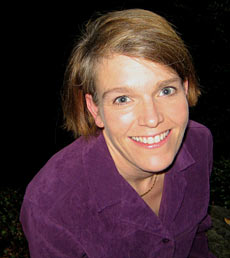UC Berkeley Press Release
Researcher wins $2.5 million NIH Pioneer Award
BERKELEY – A University of California, Berkeley, cell biologist is one of 13 researchers selected this week to receive the 2006 Pioneer Award from the National Institutes of Health (NIH).
The annual award, totaling $2.5 million over five years, is designed to fund "high-risk" research with potentially high payoff for human health.
 Rebecca Heald (Steven Hill photo) |
Rebecca W. Heald, professor of molecular and cell biology at UC Berkeley, will receive the award to support her research on a fundamental question of biology: How do cells determine the size of their internal structures, or organelles, as they get bigger or smaller?
This has implications for cancer, because many cancer cells exhibit outsized organelles. Screening for cervical cancer, for example, involves looking for grossly distorted nuclei in cervical cells collected during a Pap smear.
"The scaling of organelles is an interesting idea that has been difficult to investigate. We don't have the first clue as to what regulates it - it's a wide-open question," Heald said. "NIH is betting on me as someone who can try to answer this question, which is fundamental in cell biology."
The awards to Heald and 12 other researchers were announced Tuesday, Sept. 19, at an awards symposium held at NIH headquarters in Bethesda, Md.
The NIH created the awards in 2003 to fund what it terms "high-risk" research, that is, research that might not get funding through the standard peer-review process, either because it is too novel, spans too broad a range of disciplines, or is at too early a stage. Yet, this type of research has the potential to affect many other fields and produce important insights that will advance human health.
"The 2006 Pioneer Award recipients are a diverse group of forward-thinking scientists whose work could transform medical research," said Dr. Elias A. Zerhouni, NIH director. "The awards will give them the intellectual freedom to pursue exciting new research directions and opportunities in a range of scientific areas, from computational biology to immunology, stem cell biology, nanotechnology and drug development."
Heald, who has been a member of the UC Berkeley faculty since 1998, has done groundbreaking research on the mechanisms of cell division, focusing on the mitotic spindle apparatus, a complex macromolecular machine that segregates duplicated chromosomes equally to the two daughter cells prior to cell division.
Noting that the spindles in egg cells of the frog Xenopus laevis are much larger than the spindles of a smaller frog, Xenopus tropicalis, she recently demonstrated that the cytoplasm of the cell, not the chromosomes, seems to determine the spindle size. She plans to search for the proteins in the cytoplasm that regulate spindle size, hopefully shedding light on normal and abnormal spindle function.
"In cancer, you see defects in the separation of the chromosomes, or even complete failure of the spindle apparatus, so that cells sometimes get twice as many chromosomes as normal," Heald said. "The problem could be in any one of the hundreds of proteins that make up the spindle. It's a very complicated apparatus."
Heald attended Hamilton College and obtained her Ph.D. in cell physiology from Harvard Medical School in 1993. Heald is a monitoring editor for the Journal of Cell Biology. She was a Pew Scholar, and the 2005 recipient of the Women in Cell Biology Career Recognition Award from the American Society for Cell Biology.
Now in its third year, the Pioneer Award is a key component of the NIH Roadmap for Medical Research. The program supports exceptionally creative scientists who take highly innovative approaches to major challenges in biomedical research.
"In addition to supporting outstanding research, the Pioneer Award is an innovation in its own right. It is one way we are exploring of funding unconventional ideas that are promising but might not fare well in the traditional peer review system," Zerhouni noted.
"I am pleased that enthusiasm for the Pioneer Award program led a record number of NIH components — 11 in all — to contribute their own funds to the program this year, allowing us to support nearly twice as many awards as the NIH Roadmap budget provided."

